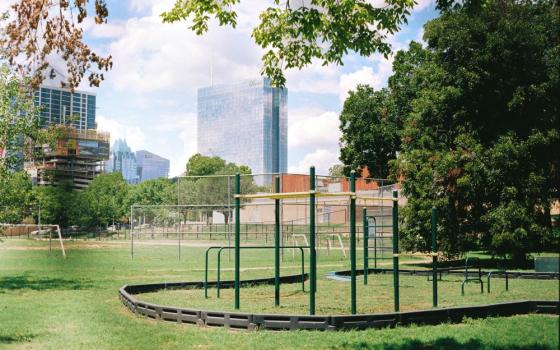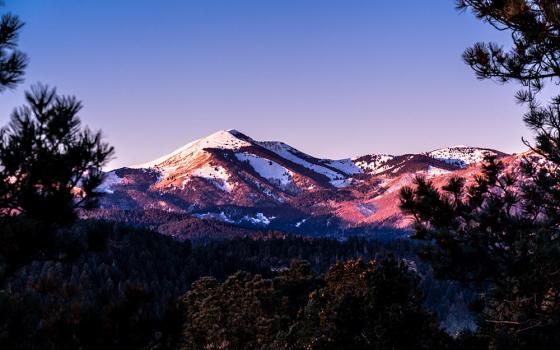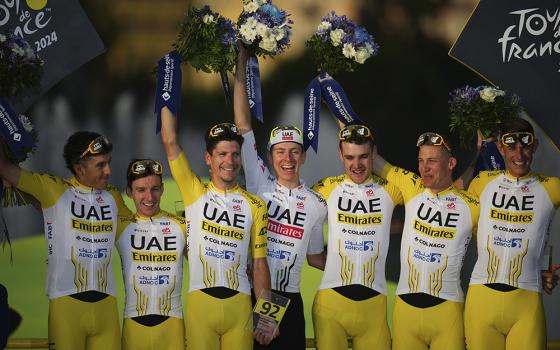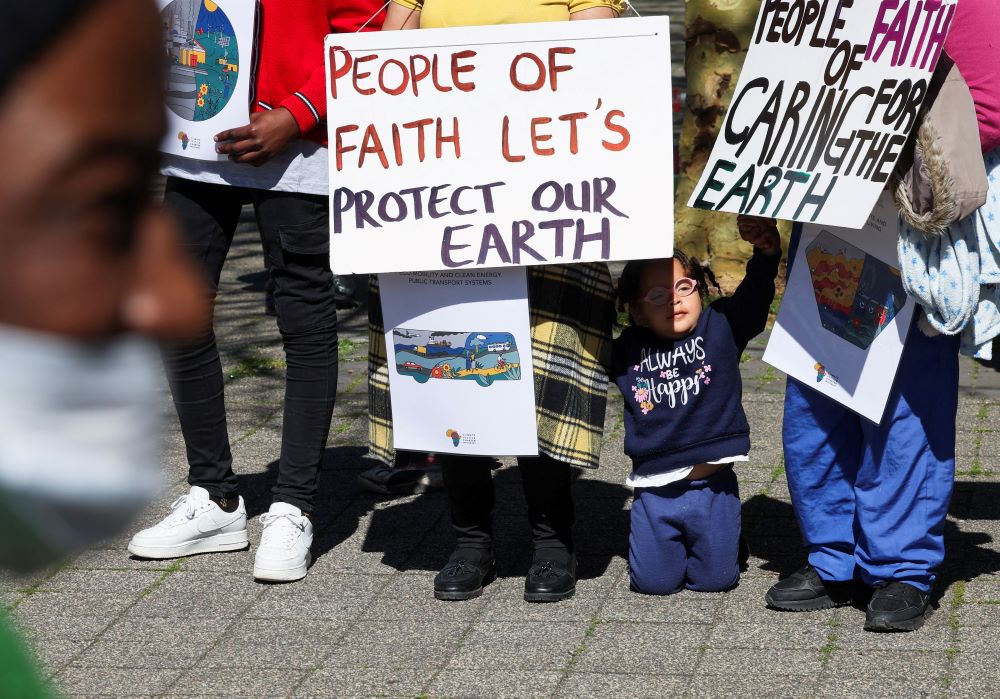
Climate activists demonstrate in South Africa outside the Cape Town International Convention Center Sept. 13, 2023, during the Southern Africa Oil and Gas Conference to call for climate justice resistance against oil and gas corporations and an end to fossil fuels. (OSV News/Reuters/Esa Alexander)
With half the world's population heading to the polls this year, the election outcomes, especially in the United States, European Union and India, will hold great consequence both for national and international efforts to address climate change and reverse biodiversity loss.
It's a situation Susana Réfega is monitoring closely.
In January, she became executive director of the Laudato Si' Movement, a network of 900-plus Catholic institutions worldwide that for nearly a decade has worked to act on Pope Francis' call for the church to engage the socio-environmental challenges facing the world today, primarily climate change and threats to biodiversity.
"It will have a very high impact on our international climate [action]," Réfega told EarthBeat in a recent interview. "It's really important that citizens are more and more aware that voting is a part of putting their faith into action."
Réfega came to Laudato Si' Movement from the fields of academia and development, having led Fundação Fé e Cooperação (Faith and Cooperation Foundation), the overseas development organization of the Portuguese bishops' conference, where she worked across Africa, including in Angola, Mozambique, East Timor and Democratic Republic of Congo.
Those firsthand experiences helped open her eyes to how climate change impacts people's lives and the necessity of addressing environmental issues alongside economic and social ones.
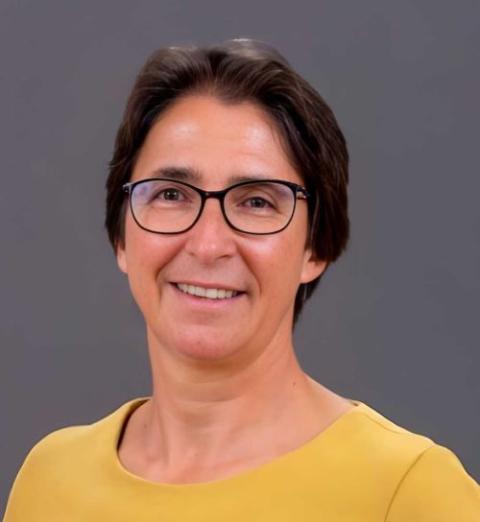
Susana Réfega is executive director of the Laudato Si' Movement. (Courtesy of Laudato Si' Movement)
But it was an experience in her home country of Portugal — attending World Youth Day in 2023 and joining the vigil with Francis where "The Letter," a documentary on his 2015 encyclical "Laudato Si', on Care for Our Common Home," was screened — that provided her "a very big spiritual call" to take on a larger role within the Catholic ecological movement.
"Just watching 'The Letter' there in that very special moment, with over 1.5 million people, for me it was very moving, and really a call to do more to bring my talents," she said. "And that was the moment for me to discern whether to apply for this position, which I did."
Réfega spoke with EarthBeat ahead of Laudato Si' Week (May 19-26). This interview has been edited for clarity and length.
EarthBeat: You have been executive director of Laudato Si' Movement for about four months. What are some early impressions of this Catholic network you now lead?
Réfega: The movement is very diverse, so I feel I'm still understanding the movement. I've been really impressed and amazed by the vitality of the movement. It's really vibrant, in terms of the initiatives that are taking place locally, the number of countries where the movement is present — nowadays, more than 150 countries.
Another striking feature for me has been how prayer is really at the heart of the movement. It's really a movement that is led by the Spirit and that means being very open to what isn't expected.
We will be celebrating 10 years next year. So it's a very young movement that has grown very fast, very organically. And looking into the future, I think that we will start, now, a stage of consolidation in certain aspects. I think these chapter structures, more and more, are very important for the movement, for our next stage of increased consolidation.
Another trend is regionalization. While we are a global movement, and that's really part of our identity and part of our strength, as the movement gets wider and has more Laudato Si' Animators and is present in more countries, there is this desire for an increased regionalization where we can also tailor the responses to the reality of the regions or we can respond to what our members are asking from the movement.
From your work in African countries, is there a moment that stands out for you in terms of witnessing the impacts of climate change on people?
Yes, definitely. And those moments were very important for me also personally, in terms of my ecological conversion as a Christian.
I recall two very strongly. One of them was in the southern part of Angola. There has been a drought now for many years in the southern provinces of Angola, and the organization I was leading — it's called Faith and Cooperation — was supporting their small farmers.
In visiting them and speaking with local communities, it was so striking to witness the impact of drought in their lives and in the lives of those communities that needed to move from one place to another, who didn't have water for their cattle or for their families. In some cases, because of the livelihoods and the way of the culture, even prioritizing the scarce water they had for the cattle in order to ensure livelihoods for their children.
Another moment that I recall was in Mozambique after the Kenneth and Idai cyclones [in 2019] in Beira, where the town was completely destroyed. And again, just speaking to teachers, to families who had lost everything — their houses, their livelihoods — but still were aware of the need to re-engage children in schools and in education, it was also very striking and very important. Both for the strategy that we were following in terms of our organization, but also for prioritizing climate change and finding responses to the climate crisis.
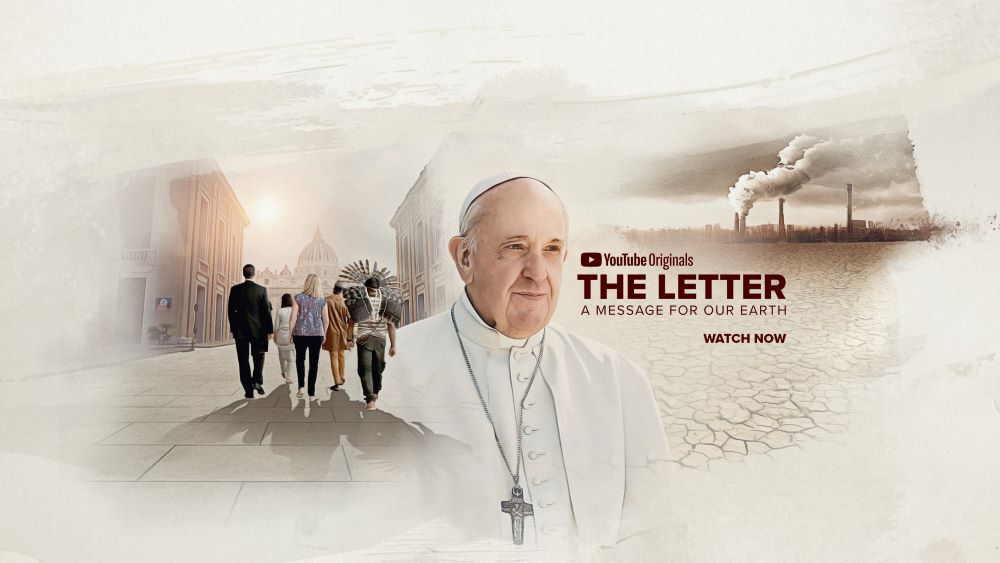
Pope Francis and global activists are pictured in a banner for the YouTube Originals film "The Letter: A Message For Our Earth," on the pope's encyclical, "Laudato Si'." The film launched Oct. 4, 2022, the feast of St. Francis of Assisi and the same day the Holy See acceded to the Paris Agreement. (CNS photo/YouTube Originals)
How have those experiences shaped how you view your work now with the Laudato Si' Movement?
First of all, this solidarity and this compassion and being close to people. Just being with people who feel they are alone facing these very difficult situations.
But also it shapes this very important priority of advocacy work. Because we can't continue to look for short-term solutions when we need to make change. So when we face these realities, of course we want to provide help, and we want to be close to people who are suffering. But it also raises questions about what is the root cause for what's happening and how can we actually change it in the longer run.
Laudato Si' Movement, among numerous initiatives, has taken the lead in encouraging Catholics everywhere to celebrate Laudato Si' Week and the ecumenical Season of Creation. Where else is its work focused today?
This year, we are working also with an advocacy aspect, with a very specific call in terms of advocacy regarding the Fossil Fuel Non-Proliferation Treaty. That's been one of our priorities in terms of advocacy, and it's going to be this year and next year. And we continue to engage not only local communities but also church leaders in advocating for endorsements regarding the proposed treaty.
We are doing this work both at the regional level and also in Rome with the Vatican. And we continue to push this agenda because we believe it's really important to work on mitigation. Adaptation is fundamental, but again, addressing the root cause — what we would call within the church the structural sin — we have to look at fossil fuels, and we're very much engaged in doing that. Engaging bishops, engaging local communities, but also establishing that dialogue with political leaders so that more and more countries can endorse the FFNPT.
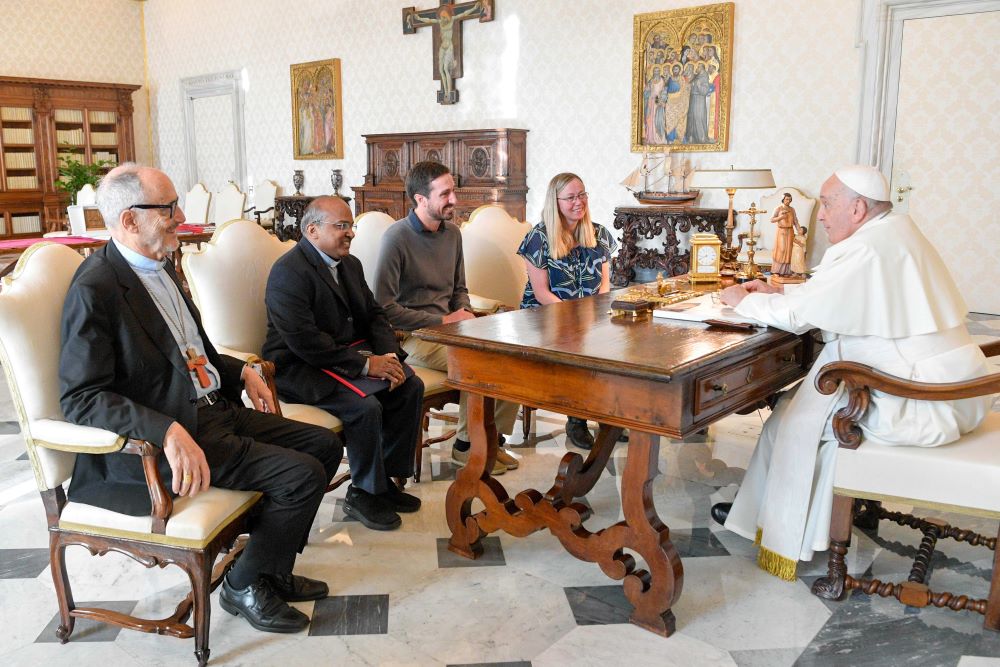
Pope Francis meets with leaders of the Laudato Si' Movement at the Vatican Nov. 6, 2023. From left are Cardinal Michael Czerny, prefect of the Dicastery for Promoting Integral Human Development, Jesuit Fr. Xavier Jeyaraj, then-executive director of Laudato Si' Movement Tomas Insua and Lorna Gold. (CNS /Vatican Media)
Cardinal Michael Czerny has spoken in support of the Fossil Non-Proliferation Treaty. Do you sense other officials in the Holy See taking a more formal position on it?
We are having those conversations. For the time being, Cardinal Czerny has been really a very prophetic ally on this road to adopting a transition from fossil fuels to clean energies.
We have support from many bishops across different parts of the world, namely in the Pacific Islands, but also at CELAM [the Latin American and Caribbean Catholic Bishops Council]. So we are making progress on that.
With the encyclical Laudato Si' marking its 10-year anniversary next year, how would you assess how the church has responded to it so far?
I think it has been really amazing and fantastic over the last 10 years.
It's true also that it was very new for many parts of the church. It's interesting you posing that question, we are launching a survey that was done across Europe in 20 countries exactly asking that question: What has happened? It's for Europe, but I think in many parts of the world the big conclusions of the survey wouldn't be that different.
And one says more than 50% of those who answered the survey weren't doing any work regarding care for creation before the encyclical. So the encyclical really opened the opportunity for the church organizations to engage.
But of course, there's a lot to be done as well. The survey also shows that the level of resources, both in terms of people and funding, that Catholic organizations are channeling to engage in care for creation is still very limited. It also raises the fact that many organizations still see this part of the work as something that has more to do with engagement of volunteers.
But another very exciting aspect of this survey, which again I think would strike in many parts of the world, is this engagement in bringing Laudato Si' to life, and living Laudato Si' is being done in a very collaborative way and very often across organizations. And that the Laudato Si' encyclical has led people more to work with one another, rather than staying in silos or closed within Catholic organizations. I think that's also very good.
This year, more than half of the world will be heading to polls to vote in elections for either presidents, prime ministers or other top government officials, which poses significant consequences for international climate action. What importance do you see in these outcomes? Are you hopeful that they will benefit work on climate action?
What I would say is, again, it's really important that citizens are more and more aware that voting is a part of putting their faith into action. At the Laudato Si' Movement, one of our colleagues mentioned that we have been focusing a lot on our carbon footprint, but it's perhaps more important to focus on our advocacy footprint. Who are we voting for? And what is our civic engagement in terms of the political decisions that are being made in our countries?
I think not being afraid of what Pope Francis calls civic and political love, which sometimes for the church is still a challenge.
So I'm hopeful for the outcomes of the elections across the countries, like India, of course the U.S. Here in Europe, we have now the elections for European Parliament, which are really critical for what will happen in the coming years.
At Laudato Si' Movement, we are also doing work that relates to raising awareness for Catholic communities that voting is really part of this engagement for Laudato Si' action. We are also engaging with the members of the parliament before the elections, sharing with them the importance of integral ecology and the environment in the work they will be doing. And actually putting more and more energy on technical discussions, locally with the grassroots, with parishes, but also with religious leaders so that we are not afraid to talk, to be vocal about the importance of the elections and the decisions that are made before and the consequences they have after.
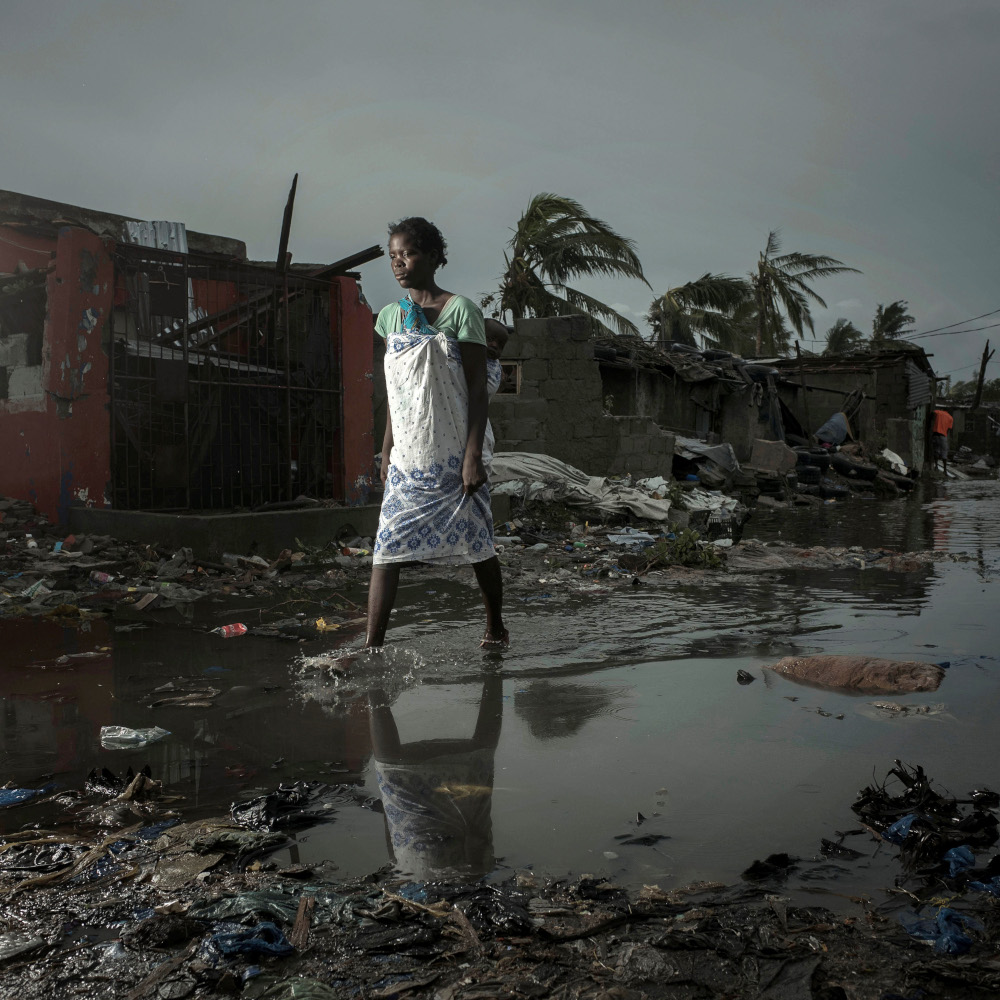
A young woman walks through floodwaters March 17, 2019, in the aftermath of Cyclone Idai in Beira, Mozambique. Hundreds were feared dead in Mozambique four days after a cyclone slammed into the country, submerging entire villages and leaving bodies floating in the floodwaters, the nation's president said. (CNS/Care International/Reuters/Josh Estey)
Is the U.S. election, where President Joe Biden and former president Donald Trump present stark contrasts on climate policy, getting much attention in Europe?
Yes. The U.S. is such a big player that there is a lot of attention regarding the election later this year. And yes, there is concern about the results that will come and the consequences that will emerge from the results of the elections.
There is a big concern also here in Europe, because we have been seeing the rise of the extreme right parties across Europe, which again have been very much not sensitive to climate issues and sometimes even of denial of climate change. So at this stage, we are focusing a lot of attention on the European elections, also because the European Union has been leading a lot of the climate agenda. And if we have a very different configuration of the European Parliament, that will have a very important impact on how Europe is leading or not leading the climate agenda.
Since its formation, Laudato Si' Movement has been present at the United Nations climate summits. How are you approaching COP29 in November?
COP29 this year will be in Azerbaijan, another oil producer, and we are quite aware there will be a lot of lobbying from the fuel industry and the oil industry. But despite the challenges, the frustrations of different COPs, we still believe that the COPs are an important space for multilateral negotiations.
We are already looking into COP30 for a number of reasons. And actually, we are already making very strong inroads. We've been meeting with the bishops' conference in Brazil for many years.
So I'm not taking out the importance of this year's COP, and we'll continue our agenda focusing on mitigation, focusing on energy transition, and we'll be participating. But we already are planning very intensely for COP30 and for the messages, again, we want to take them there as the church, and also engagement with youth in Brazil that are very committed to this agenda.
Advertisement
Are there particular messages from Pope Francis that resonate with you or that you draw inspiration from?
One I already mentioned is civic and political love. I think it's really a very powerful message in terms of action.
But when I think of the Laudato Si' encyclical — I mean I read it, I reread it and I'm always very inspired — but in the end, I always get back to "Everything is interconnected." And the pope says there we can never emphasize enough that everything is interconnected.
We can understand it with our brain, with our intelligence, but it's actually a lot deeper in terms of understanding this relation with God, relation with one another, relation with the Earth and how that can be such a change and inner change, a spiritual change in terms of the interconnectedness of relationships, but of course, also the interconnectedness of the crises.
Especially in Western cultures, we tend to segment things and put things in boxes, all of us trying to organize things. Whenever we try to separate the social crisis from the economic crisis or the environmental crisis, we get everything wrong. So this interconnectedness, and at the personal level of relationships that are interconnected. As Pope Francis says, "No one can be saved alone."
Beyond Pope Francis, are there other Catholic voices that you turn to for inspiration, wisdom or hope?
I must confess the Catholic voices that kind of give me more hope and inspiration are those of common people. Just people that I come across and meet — like I was saying before, a Mozambican woman not giving up and engaging in her local community and being part of the local school.
Or nowadays, the voices that inspire me a lot are Laudato Si' Animators that I meet. We were meeting last week with a religious woman from Burma sharing her work, or some animators in Kenya or even here also in Portugal at university, some of my students who were very strong environmental activists. So I get a lot of energy and inspiration from common people, like you, like me, people that I just come across and listen to and that share their stories. That's really powerful for me.





